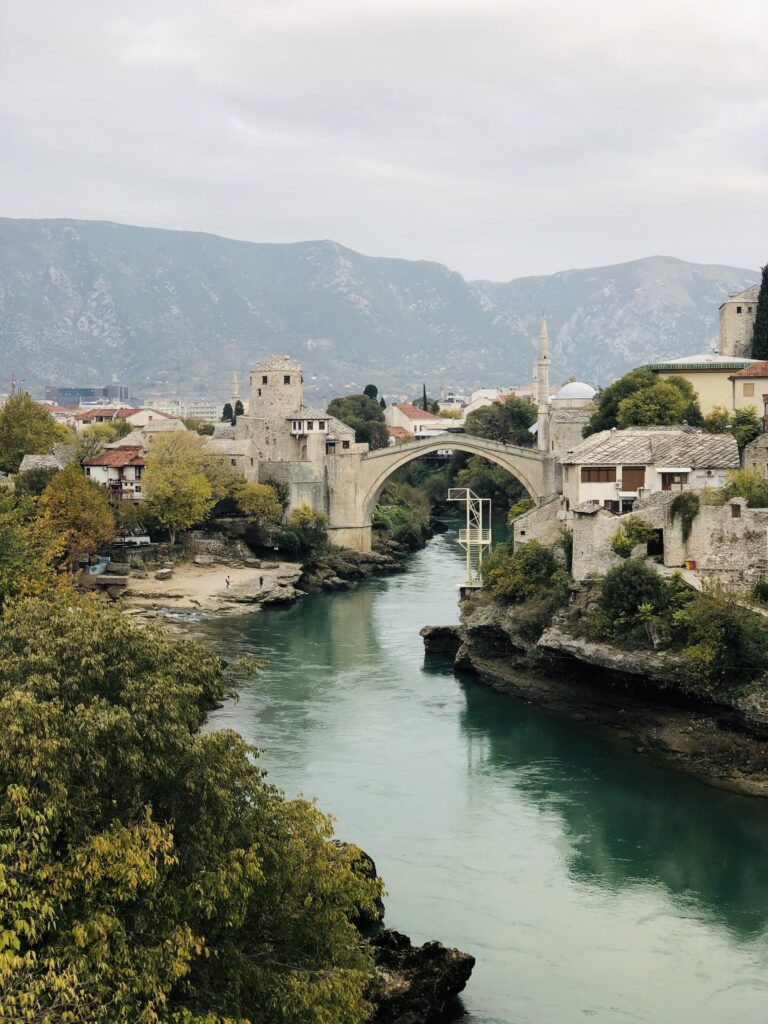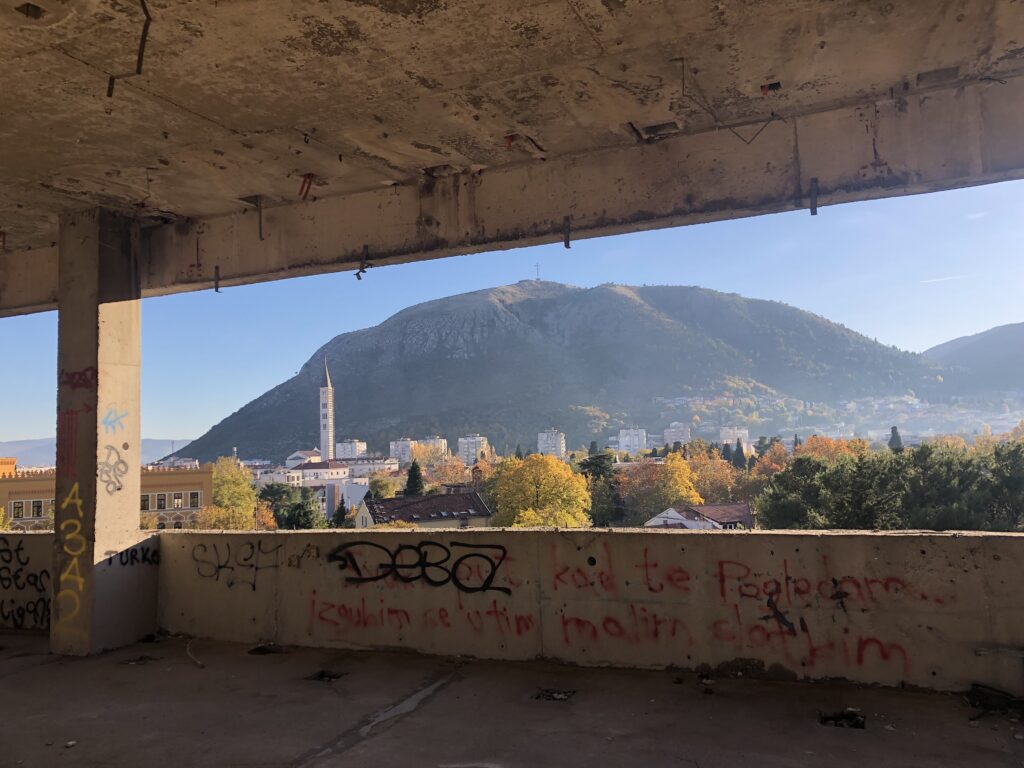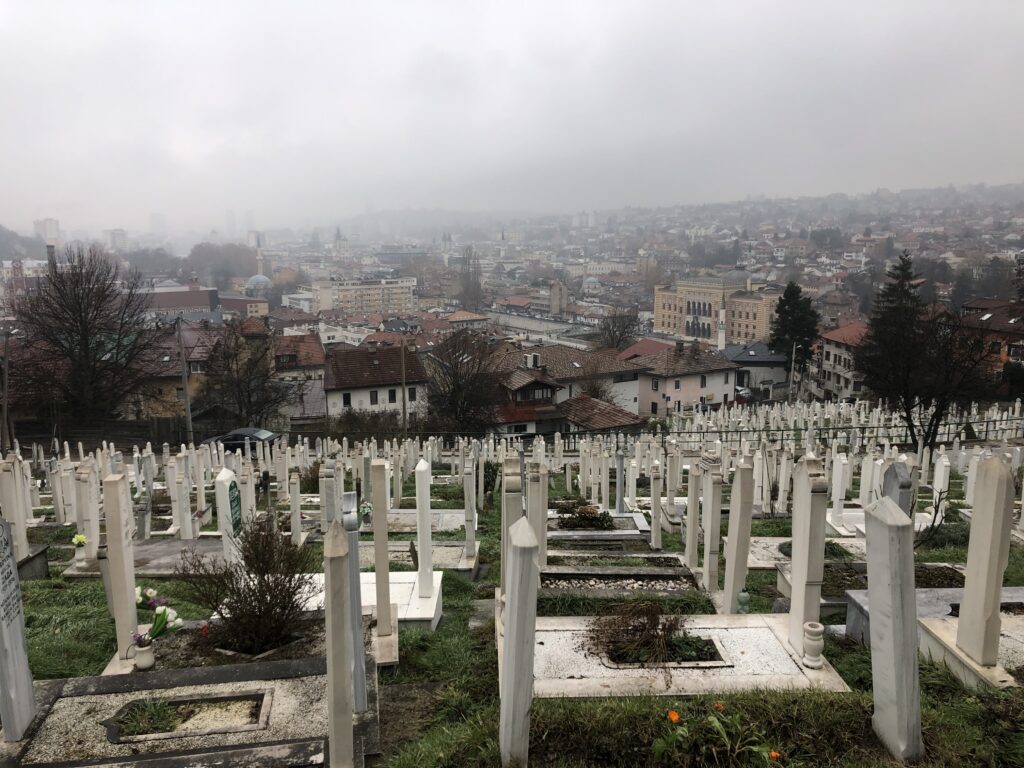Light Snacks, Heavy Stories
Mostar, Nov 2024
I was visiting with Elva last night; she offered to do my laundry and I was also going to help her with a grant proposal. She still did my laundry but instead of me helping her, she fed me a salad, homemade bread, cheese, tea, and nut butters and we just chatted in the kitchen. She pulled out hazelnut and peanut butter, and specifically mentioned, “the hazelnut is good, a locally made one. Peanut butter, I can’t eat. We had so much peanut butter during the war, I can’t stand it now, I don’t know why we have it.”
“Why so much peanut butter? I wouldn’t have expected that!” I asked, surprised by the sudden mention of the war. Then I reminded myself that I shouldn’t have been surprised; it’s a topic sprinkled into the majority of conversations here in Mostar.
“Well, we received so many parachutes from USAid, and I always seemed to get the ones with peanut butter. Americans love peanut butter. The parachutes were numbered, 1-25, each one with different foods that could last a million years if they needed to.”
I asked Elva if she would be willing to share more of her stories with me, and she was happy to despite saying, “I was only 14 but I do remember it all. But my stories aren’t really about the war itself, I wasn’t even really there. I was lucky to have left.”
“When did you leave? Where did you go?”
“None of us expected it. But as soon as there were a few bombs, my father took us to Croatia, where he had a friend who let us stay. My brother and I were so excited — no school!” She laughed softly, then her tone shifted. “But then, no school for weeks became months, and we were scared and wanted to go home. We wanted to go to school. Isn’t that totally crazy?
At one point, we did go home. Things settled down you know, after the first year. So I returned to Mostar with my father. But then, soon after, a Croatian warned us–he told my father, ‘you need to get her out of here.’ ‘Her,’ as in, me. Luckily, my father listened. He took me back to Croatia that day to my mother, sister, and brother. Then he returned home again — people were crazy about protecting their property, you know? If you left your property empty, it would get looted in days, completely stripped. So my father wanted to stay and protect our family’s home. But the next day, he was taken to a concentration camp. I still can’t believe it. If that Croat hadn’t warned us, I would have been taken, too. And those camps, for both men and women, but mostly women, I don’t even want to think. All the women were violated, you know. And my father, he had horrible experiences too.”
I was sitting there sipping my tea between dramatic facial expressions, trying to comprehend all she was saying, wondering how it could all have been a lived experience.

“So you spent how much longer in Croatia?” I asked.
“Well, at that point it was basically a crime for a Croat to house Bosnians. That family wanted to let us stay but their neighbors were giving them such a hard time. But there was this Serbian woman, who didn’t care about anything, she said, ‘everyone already hates me, so just come stay with me.’ It was so nice. But only for a little while, then we moved to a refugee camp there.
Anyways, we stayed so long; we couldn’t go home. And it was terrible for me–they wouldn’t let me go to school. My brother, Adi, got to go because he was a boy, and my sister because she was so young. But I was a girl, and a Bosnian, and I couldn’t go. That was terrible, how could they do that? That’s just discrimination, you know?”
“That’s terrible. And crazy how as a teenage girl having lost so much already, and only wanting to go to school, they could take that away from you too.” I shook my head slowly, truly struggling to process all of Elva’s accounts.
“Well eventually, we created our own Bosnian schools in Croatia. But I had to hitchhike and then take a bus–two and a half hours–every day, just to go to school. They just set it up in an old factory, but it was still good enough.
Now, I am still in touch with all my friends from the refugee camp. They live all over the world now, but we’re so close, because of what we went through together. Now we laugh about some of it even, and really, we’re so close. We shared so much.”
“Oh I’m sure, both the good and the bad experiences would form such a bond between you.”
“Yes and it was different for us,” Elva said, her voice softening. “we didn’t experience the war itself so much but we experienced, you know, this isolation of being Bosnian in Croatia when the Croats just hated us and we never could understand why.
My friends and others who were here in Mostar during the war, because somehow some of them stayed the whole time, have other stories too. One time they heard on loudspeakers throughout the city an officer or whoever saying that he knew Bosnians were so, how do you say, like so musical, and then he said, ‘well let them enjoy our music,’ and then there were just sounds of bombs everywhere in the city, bombs going off all over. So horrible.”
I covered my mouth with my hand in horror.

“Anyways, what did you think of the bread?” She changed the subject lightheartedly. When I had arrived earlier, Elva had made me a plate of her homemade bread and a couple of types of cheeses, but as I listened to her I had forgotten to continue nibbling.
“Oh, so good, really!” And I took another bite, reminded of the snacks.
“Bosnian people love bread. Have you noticed?” She said with a laugh. “They say that bread saved us through the war. We had to have bread because it was actually filling, and people could make it easily, and we still always have it. It’s the only thing we didn’t get sick of somehow. But rice, many Bosnians hate rice for basically the same reason. Like how I hated peanut butter, so many people got sick of just packages and packages of rice.”
I laughed, not because it was funny, just because Elva has a way of bringing levity even to dire situations, and she said it in away that invited nostalgic laughter into the memories, not sadness.
“And another thing, have you noticed how people never leave leftovers on plate? It’s basically a crime, to throw away any food, because we never had enough during the war.” I know she wasn’t trying to comment on me not eating all of my food, but I was determined in that moment to make sure I finished what was on my plate, although taking my time to do so.
“Seriously,” she continued, “Even at a restaurant, if I leave something uneaten, a friend or whoever will just reach over and eat it off my plate!” She mimed someone grabbing food off a plate, her voice rising in pitch as she finished the sentence in laughter once again.
As I sat across from Elva, the warmth of tea in my hands and the weight of her words settling in, I felt the quiet persistence of memory—how it lingers in the foods we eat, the habits we keep, the friendships that endure across continents. The war had taken so much from her and countless others in Bosnia & Herzegovina, yet she carried it with grace, finding ways to laugh, to share, to nourish. I finished the last bite of bread, aware now of how even the simplest things—a meal, a conversation—could hold entire histories. And in that moment, I wasn’t just listening to war stories; I was witnessing the resilience of a life rebuilt and a hope that would carry on.

![Vignettes by V [and other miscellany] logo](https://vignettesbyv.com/wp-content/uploads/2024/04/C96F28F1-618C-41EB-832A-E04D4A6EC68D.png)
![Vignettes by V [and other miscellany] logo](https://vignettesbyv.com/wp-content/uploads/2024/04/C96F28F1-618C-41EB-832A-E04D4A6EC68D-300x300.png)